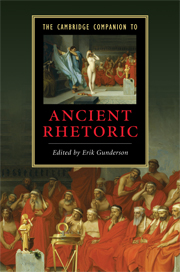Book contents
- Frontmatter
- Introduction
- Part 1 An archaeology of rhetoric
- 1 Fighting words: Status, stature, and verbal contest in archaic poetry
- 2 The philosophy of rhetoric and the rhetoric of philosophy
- 3 Codifications of rhetoric
- Part II The field of language
- Part III The practice of rhetoric
- Part IV Epilogoues
- Appendix 1: Rhetorical terms
- Appendix 2: Authors and prominent individuals
- References
- Index of passages
- Index of subjects
- Series list
1 - Fighting words: Status, stature, and verbal contest in archaic poetry
from Part 1 - An archaeology of rhetoric
Published online by Cambridge University Press: 28 January 2010
- Frontmatter
- Introduction
- Part 1 An archaeology of rhetoric
- 1 Fighting words: Status, stature, and verbal contest in archaic poetry
- 2 The philosophy of rhetoric and the rhetoric of philosophy
- 3 Codifications of rhetoric
- Part II The field of language
- Part III The practice of rhetoric
- Part IV Epilogoues
- Appendix 1: Rhetorical terms
- Appendix 2: Authors and prominent individuals
- References
- Index of passages
- Index of subjects
- Series list
Summary
In book 23 of the Iliad, Ajax the son of Oïleus loses a foot race to Odysseus and ends up on the ground with a mouth full of cow dung. On receiving second prize (an ox, fittingly enough), he spits the dung from his mouth (onthon apoptuōn) and says, “Damn, the goddess tripped me up; she always stands like a mother by Odysseus and cares for him.” His audience of fellow warriors laughs happily (hēdu gelassan) at his remark, and the potential for shaming and conflict ends there (780-84). If some speech (such as that of the dilatory Nestor) flows like honey – being by implication persuasive, well composed, and fair-minded – other utterances fill the mouth with bile and splatter their targets. The one mode is lofty, judicious, and even perhaps divine; the other is agonistic, scrappy, and tied to the body and the earth.
While this “praise and blame” model for understanding early speech performance is clearly too schematic, it serves as a necessary starting point for assessing archaic awareness of verbal tactics. The scene from the Iliad, although clearly not an extended speech, offers an example of jocular tactics that constitute a mild but telling form of abuse in an agonistic setting. The incident as a whole, trivial and brief as it is, points to a conundrum crucial in reconstructing awareness of speech techniques before the advent of prose writing and rhetorical treatises on speech composition – namely, why the happy laughter? Why is Ajax’s performance successful in defusing the incident and bonding with the audience?
- Type
- Chapter
- Information
- The Cambridge Companion to Ancient Rhetoric , pp. 27 - 42Publisher: Cambridge University PressPrint publication year: 2009
- 1
- Cited by



